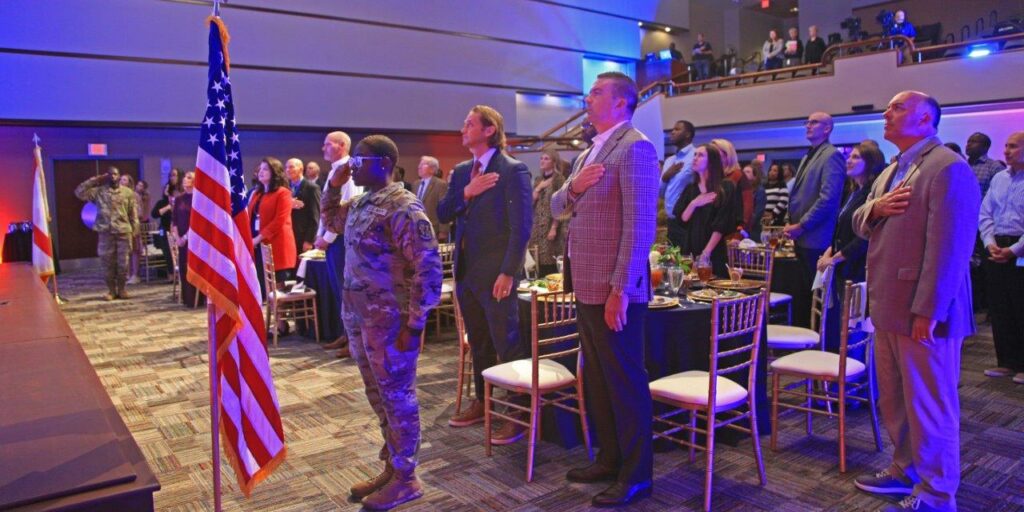The legacy of Harold A. Franklin, Auburn University’s first African American student, will live on forever through a specially designed desegregation marker expanse that was unveiled on campus at a recent celebration ceremony.
The area near the marker – adjacent to the Ralph Brown Draughon Library, where he first registered for classes – commemorates Franklin’s courageous efforts to desegregate the land-grant institution and has been expanded with hardscaping and landscaping enhancements, including a new bronze plaque and circular, brick courtyard. Franklin, who died Sept. 9 at 88, integrated Auburn as the university’s first Black student on Jan. 4, 1964, coming to the Plains as a graduate school enrollee.
“There’s nothing more we can say as a family except thank you for all you’ve done,” Harold Franklin Jr. said. “So, I’d like to thank all of you not from the bottom of my heart, but from my entire heart.”
The elder Franklin went on to a successful 27-year career in higher education after leaving Auburn in 1965, earning a master’s degree in international studies from the University of Denver and teaching history at Alabama State University, North Carolina A&T State University, Tuskegee Institute and Talladega College before retiring in 1992. Franklin initially was not allowed to defend his thesis in the Department of History at Auburn, a wrong that was righted on Feb. 19, 2020. He then participated in commencement exercises on Dec. 12.
“It is an honor to recognize Dr. Franklin with this courtyard, as he was a pioneer who paved the way for other African American students to attend Auburn University,” Auburn President Jay Gogue said. “Auburn is a better institution because of Dr. Franklin’s bravery 57 years ago, and his spirit of internal fortitude will continue to inspire us.”
In 2001, Auburn honored Franklin for being its first Black student by awarding him an honorary Doctor of Arts. The Auburn Alumni Association’s Black Alumni Council recently named a scholarship in honor of Franklin, whose legacy also was honored in 2008 when Auburn students created the Harold A. Franklin Society.
“This occasion is about honoring a proud man who never asked for anything but opportunity,” said Kenneth Kelly, a 1990 Auburn alumnus and chairman and CEO of First Independence Bank of Detroit. “Dr. Harold Franklin, who had served in Korea, was mature enough to know that his actions were going to benefit others more than it would benefit himself. Can you imagine the fortitude of a married man at 31 years old risking so much?
“Today we enshrine a leader in our nest and honor him and his legacy, a legacy that will be part of every official tour of Auburn. The name Dr. Harold Alonza Franklin will be part of Auburn forever.”
Born on Nov. 2, 1932, in Talladega, Franklin was one of 10 children of George Franklin Sr. and Henrietta Eugenia Williams Franklin. His father worked at the Alabama School for the Deaf and Blind, while his mother taught and played piano in church.
During his senior year of high school, the United States was embroiled in the Korean War, and Franklin left school to join the U.S. Air Force. After graduating from Alabama State College in 1962, he thought about attending law school before Fred Gray – the famous civil rights attorney who represented the Rev. Martin Luther King Jr. – encouraged him to study history at Auburn.
“It is such an honor to be here and recognize yet another major milestone in the forward progress of Auburn, a tribute to such a courageous trailblazer – the first – whose steps forward set it all in motion 57 years ago,” Auburn Board of Trustees member Elizabeth Huntley said. “It is especially fitting that we honor him today, on Veterans Day, as a member of the armed forces. We, as the Auburn family, owe an enormous debt of gratitude to the late Harold Franklin, whose steadfast resolve as Auburn’s first African American student opened the door for generations to come.
“I only wish Dr. Franklin could be with us today, but as we imagine his first footsteps on this campus near this very site – where he registered in our library for classes in 1964 – we know the path he paved continues to guide our way forever onward.”
Franklin married Lilla Mae Sherman, who preceded him in death. They had one son, Harold Franklin Jr. After he retired from teaching, Franklin worked as the manager of a funeral home in Sylacauga.
While on campus to defend his master’s thesis inside Thach Hall’s Bond Memorial Library in 2020, Franklin met with members of Auburn’s Black Student Union as part of Black History Month celebrations.
He was unable to participate in the May 2020 commencement ceremonies after the university postponed them due to the pandemic, but he received his diploma by mail in June. He returned to Auburn in December for commencement and participated in a hooding ceremony for Shari L. Williams, Auburn’s first female Black doctoral graduate in the Department of History.
The new bronze plaque states, in part, “Dr. Franklin’s bold journey is the epitome of a spirit that is not afraid. His story continues to move our hearts, stimulate our minds and inspire our lives. The same spirit dwells within, reminding us that truth will always prevail.”
This story originally appeared on Auburn University’s website.
(Courtesy of Alabama NewsCenter)













